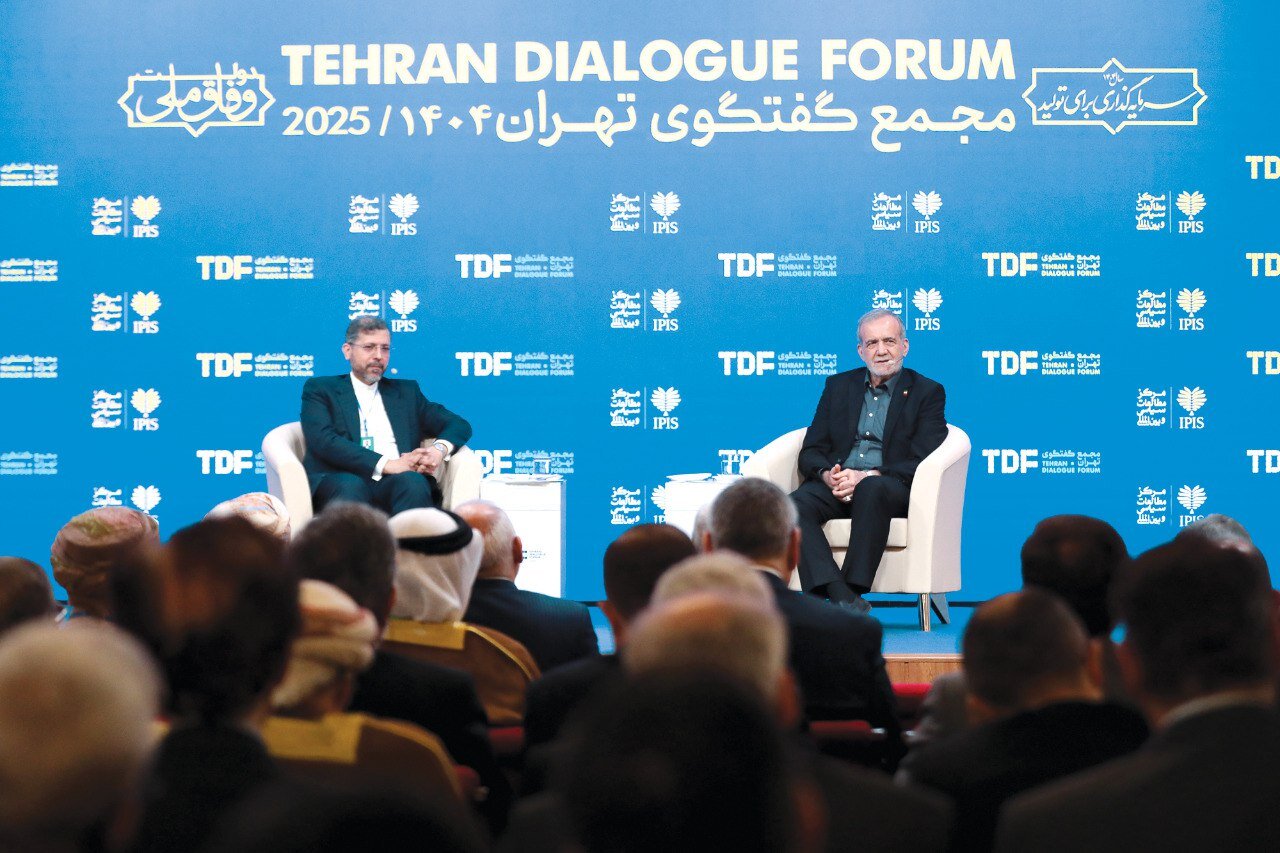Pezeshkian: Iran will never give up its peaceful nuclear program
Tehran Dialogue Forum 2025 : Officials, diplomats, and experts gather for two-day event on regional issues

TEHRAN – Journalists, diplomatic missions, dignitaries, and scholars took to the busy roads of Tehran in the early hours of Sunday (the second day of the week in Iran) to reach a grand international gathering in the north of the capital: the Tehran Dialogue Forum (TDF).
The venue was the School of International Relations, a well-known institution that has trained many of the country's diplomats for decades. Journalists arrived prior to other attendees, allowing them time to set up their cameras and review the schedule and locations for the day's discussions.
Then came the opening. In a hall filled with distinguished individuals, Iran’s Foreign Minister Seyyed Abbas Araghchi welcomed the participants, including President Masoud Pezeshkian, before highlighting key developments of the past year, with a focus on the suffering in Gaza.
“Since October 2023, over sixty thousand Palestinians in the Gaza Strip have lost their lives—many of them women and children. Millions have been displaced, forced into siege conditions, and deliberately subjected to starvation and famine. What is even more distressing is the world’s failure to respond with the responsibility and urgency that such atrocities demand,” Araghchi explained. He called on the attendees to use the TDF as an opportunity to start moving towards a “homegrown” regional order, one that does not sacrifice peace, human dignity, and conscience for political gains.
“West Asia is in urgent need of a fundamental reassessment of its self-perception. Years of fixation on manufactured rivalries— often fueled by the illusion of perpetual threats—have stymied meaningful cooperation, obstructed the resolution of common challenges, and opened the door to destabilizing foreign interference,” he added.
Pezeshkian himself also spoke on the first day of the forum, discussing one of the most important foreign policy processes of Iran currently underway: the indirect nuclear talks with Washington. “We will never give up our peaceful nuclear program,” he said, before telling his American counterparts that neither sanctions nor threats would manage to intimidate Iran. “This is our right. We will continue to flourish even if you never abandon your pressure tactics.”
Following the opening, a number of panels and interviews took place. Among them, the discussion between Saeed Khatibzadeh, head of Iran's Institute for Political and International Studies, and Nechirvan Barzani, the president of Iraq's Kurdistan region, made a splash in Iranian media.
Speaking in fluent Persian, Barzani highlighted the strong relationship between Iraq's Kurdistan region and Iran. He recalled his time as a university student in Iran and noted that Iraqi Kurds seeking refuge there in the 1940s were warmly welcomed. “We were not even treated as guests," Barzani said. "We were treated as if we were in our own home.”
Barzani noted that President Pezeshkian's "historic" visit to Iraq's Kurdistan region in September 2024 ushered in a new era of relations. "We have always been thankful to Iranians," Barzani stated. "Iran was the first country that helped us in the fight against Daesh terrorists [in the 2010s], but that trip deepened ties between Iran and the Kurdistan region more than ever before.”
Another notable discussion was held between Mohammad Reza Bahrami, the Iranian foreign ministry’s Director General for South Asian Affairs, and Amir Khan Muttaqi, Afghanistan’s acting foreign minister. The Taliban official addressed the most pressing issue between Iran and Afghanistan, the Hirmand River Water Treaty. He said the Taliban does not want to uphold Iran’s water rights based on “human”, “neighborly”, and “religious” principles. He also noted that peace in Afghanistan would be beneficial to all parties in the region.
The TDF is set to continue on Monday, with a focus on Palestine, Iran’s program, the situation in Afghanistan, and regional nonproliferation. It is convening 200 delegations from 53 countries, as well as representatives of the United Nations.
Iran’s Deputy Foreign Minister Majid Takht-e-Ravanchi said the forum so far has managed to create a valuable space for regional countries to come together, collaborate, and discuss important issues in a scholarly environment. “The Tehran Dialogue Forum has been running for several years now, and this year saw significant participation from various countries, particularly our neighbors,” he told reporters on the sidelines of the first day of the event. “We believe that these discussions can help foster better understanding among countries in the region, which is crucial for making the most of our relationships.”
By Soheila Zarfam
Leave a Comment